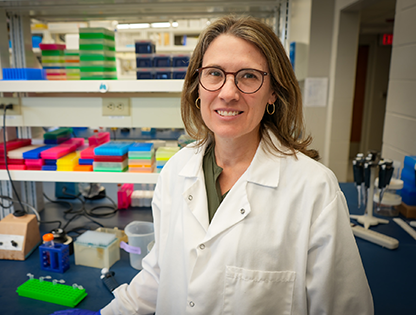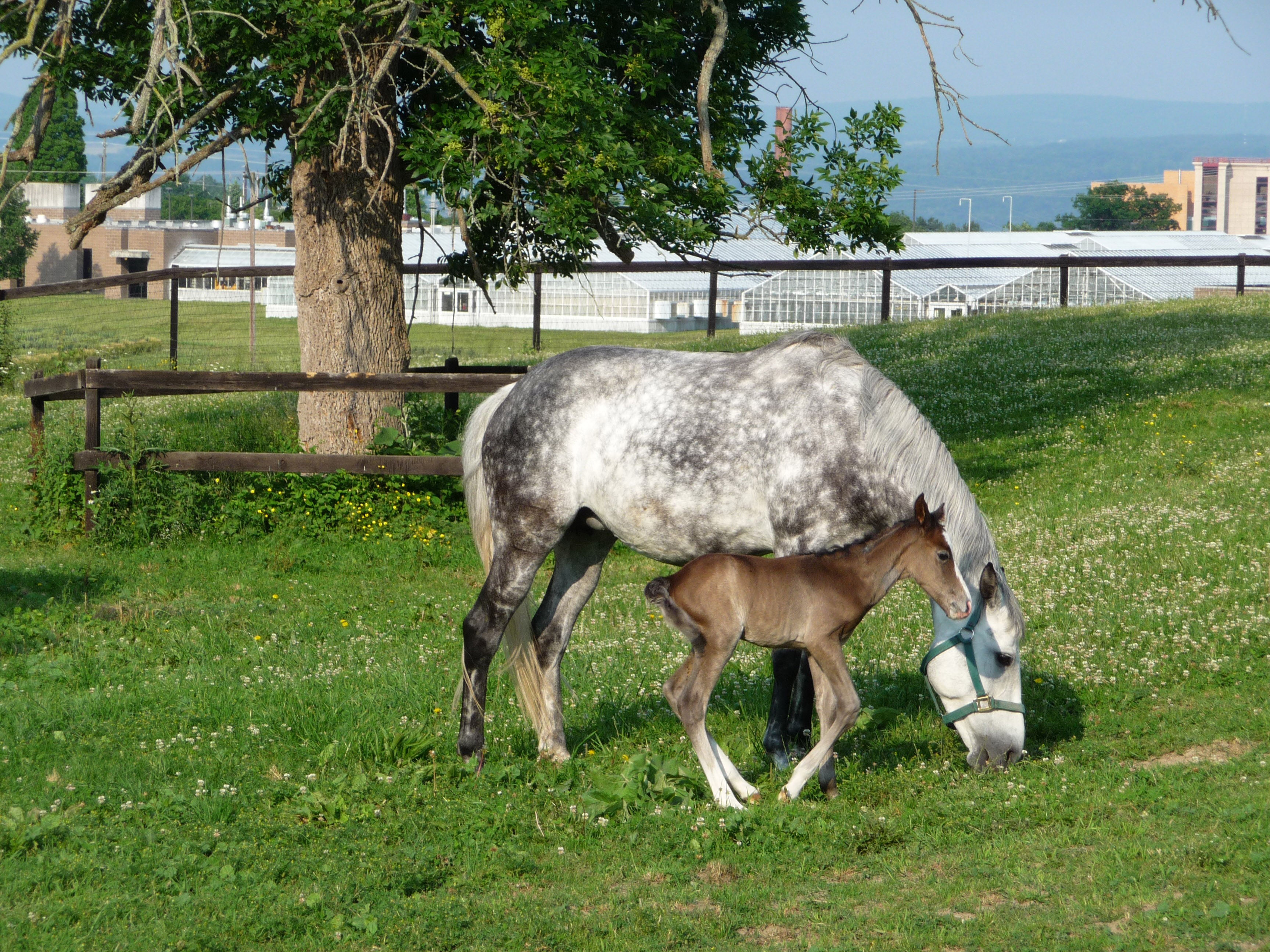Mandi de Mestre, BVSc (hons) PhD, PGCAP, MRCVS

Director, Baker Institute for Animal Health
Director, Cornell Equine
Dorothy Havemeyer McConville Professor of Equine Medicine
Department of Biomedical Sciences
Baker Institute for Animal Health
Office:
Email: amm43@cornell.edu
Dr. de Mestre's Work
Work in Dr. de Mestre's laboratory focuses on understanding the normal processes required to support a healthy pregnancy and delivery of a neonate programmed for lifelong health as well as identifying the pathologies that compromise pregnancy including those that are lethal.
The Equine Pregnancy Laboratory program focuses on unraveling the molecular and cellular mechanisms that regulate placental development and function in normal and failing pregnancies that has both immediate implications for fetal survival as well as long term implications for offspring health. Our wider goal is to support evidence based clinical decision making in reproductive medicine through improved strategies to manage equine fertility and welfare of breeding mares. Through collaborative research, we have applied a multidisciplinary approach (molecular and cellular biology, pathology, immunology, genetics and epidemiology) to tackle some of the more difficult questions of pregnancy including identifying key processes that regulate early placental development, novel causes and risk factors of pregnancy loss, and congenital conditions of foals. The mare also provides a unique natural disease model to discover fundamental molecular events of early development that could inform health strategies for pregnancy pathologies in humans and other veterinary species.
Projects
Genome stability in the placentae
Early pregnancy loss (EPL) in farm animals and horses results in significant economic losses, and when it occurs in women, can also cause great emotional distress. Despite its clear importance to all these mammalian species, treatments that prevent or reduce the risk of early pregnancy loss remain scarce. This is related to an inability to identify the underlying cause of the pregnancy loss as well as a difficulty in obtaining relevant suitable fetal and placental material from healthy and failing pregnancies within the first 6 weeks of conception. Whilst rodent models have been able to go some way to help elucidate specific molecular pathways of early pregnancy, they do not replicate the naturally occurring clinical condition of EPL. We have systems optimized to study both normal pregnancy and failing pregnancies in the mare over this important 6 week period. One of our focuses is to identify genetic causes of early pregnancy loss that can lead to new diagnostic tests and treatments. We have recently identified two phenomena associated with early pregnancy failure in the mare: aneuploidy (loss of gain of a whole chromosome) and copy number variation (CNV) (small segments of chromosomes duplicated or deleted). Current research is focusing on the mechanisms that lead to the development of CNV in the placenta as well as the consequences of both pathogenic CNVs as well as widespread disruption of the genome by CNVs.
Regulation of early placental development
We now know that placental growth is intricately linked not only to the successful delivery of a live foal but also importantly in programming a fetus for lifelong health. Further, over the last 10 years, significant leaps forward have been made in other species in the development of novel systems to deliver therapeutics directly to the placenta, and as a consequence treat placental pathologies. Use of these approaches require a complex understanding of how the placenta grows and functions, information we know little about in the mare and for which gaps remain in human placental biology. We are exploring exactly what proteins are essential for placental development of the early placenta and exactly what cells within the placenta that these proteins act upon. In the long term, these key proteins could be monitored in the serum of pregnant mares as a marker of placental health as it is known from other species that the placenta sheds molecules that can be detected in the mother’s blood stream. In the long term, the key proteins identified in the study could also inform the development of new interventional approaches in pregnancy that aim to optimize fetal growth and reduce the chance of programming an individual for susceptibility to adult diseases.
Epidemiology and Genetics of Congenital Musculoskeletal Disorders in Neonatal Thoroughbreds
Over the last decade, the concept of Developmental Origins of Health and Disease has gained great traction across all species and the horse is no exception. Nevertheless, we are only just starting to scratch the surface on the important implications of periconceptual and pregnancy exposures for long term health and performance. Congenital developmental orthopaedic disorders (cDOD) are the most significant contributor to Thoroughbred (TB) mortality and the most common reason for a veterinary surgeon to examine a foal in the first week of life (Mouncey et al, 2022). Further, mild to moderate disease that does not resolve can have long term effects on musculoskeletal health and subsequently athletic and/or economic performance. Despite the clear importance of cDOD, little is known about the underlying aetiology.
In this project we are collaborating with epidemiologist Prof. Kristien Verheyen (Royal Veterinary College UK) and clinician Dr Liam MacGillivray (Newmarket Equine Hospital), to investigate the contribution of gestational exposures as well as genetic variants to the development of cDOD in Thoroughbred foals. In line with the laboratories interests in early pregnancy, we are particularly interested in identifying causative genetic variants involving genes responsible for early embryonic patterning in the limb, that when disrupted, may result in severe cases of angular and flexural limb deformities. Our hypothesis is these will mostly originate in early embryonic and fetal development. These findings will inform management and veterinary practices which can be modified to minimize the exposure to risk factors for these conditions, ultimately minimizing the incidence of conformational abnormalities, and by association foaling complications.
Development of a non-invasive diagnostic test to assess fetal health in the pregnant mare
Pregnancy loss in the mare can occur anytime between conception and foaling. Currently veterinary surgeons have limited tools available to them to identify non-infectious reasons for a pregnancy to fail. We recently found the most common non-infectious cause of pregnancy loss is aneuploidy, the gain or loss of a whole chromosome that creates a significant genetic imbalance often incompatible with life (Shilton et al, 2020). Small genetic changes such as those involving a single point in the fetuses’ genome can also lead to pregnancy loss, such as fragile foal syndrome recently reported in a Thoroughbred and better known in Warmbloods. We are working with Prof. Madeleine Campbell and Prof Richard Lea, University of Nottingham, with the aim to develop blood and tissue tests with the capacity to concurrently monitor fetal genetic health and identify fetal sex in the pregnant mare. Testing could be applied retrospectively to diagnose the underlying cause of pregnancy loss using tissue as well as identify pregnant mares at future risk of losing their pregnancy.
Read more about Dr. de Mestre in her recently featured Cornell faculty profile Q & A.



